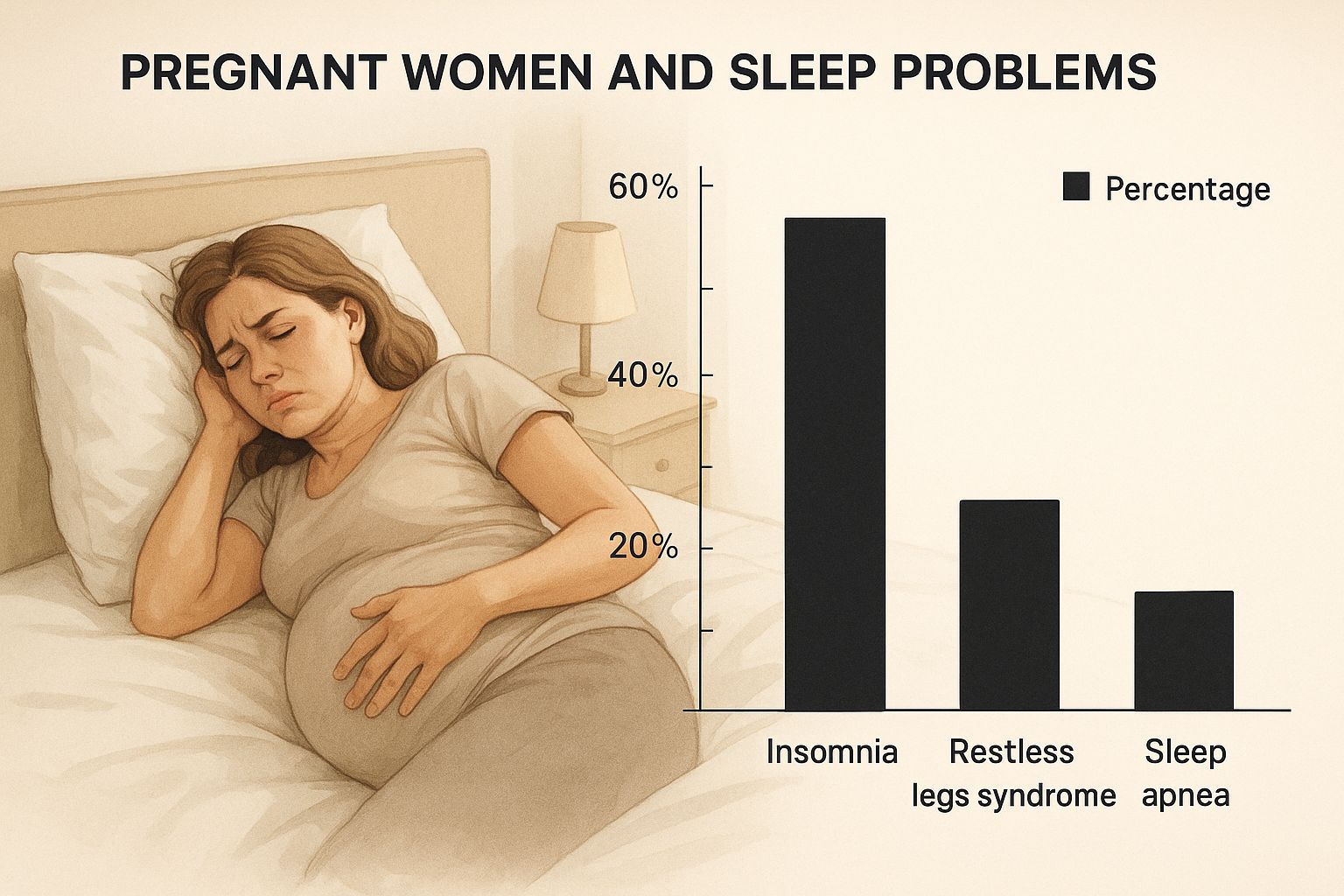If you're pregnant and struggling to sleep, you're not alone. The secret isn't some magic fix, but rather a combination of finding a comfortable position, creating a wind-down routine, and making your bedroom a true sleep sanctuary. These adjustments can honestly make a world of difference as your body goes through its amazing transformation.
Why Is Sleep So Hard to Find During Pregnancy?
Pregnancy is an incredible journey, but let's be real—it can also bring some seriously restless nights. While your growing belly is the most obvious reason for tossing and turning, a whole host of other factors are working behind the scenes to mess with your sleep. Getting to the bottom of why you're so exhausted is the first step toward getting some real rest.
Your body is swimming in a new cocktail of hormones. For instance, progesterone levels are surging, which can leave you feeling sleepy all day but, ironically, can lead to more fragmented, less refreshing sleep at night. That same hormone is also responsible for relaxing your muscles, including the one that keeps stomach acid where it belongs, leading to that lovely middle-of-the-night heartburn.
Physical and Hormonal Hurdles
Beyond the hormonal rollercoaster, there are plenty of physical changes conspiring to keep you awake. Your blood volume increases and your kidneys go into overdrive, which means you're making a lot more trips to the bathroom, often right after you've finally gotten comfortable.
Many women find themselves dealing with a few common sleep disruptors:
- Back and Hip Pain: All that extra weight puts a ton of pressure on your joints and ligaments. It can be a real challenge to find any position that doesn't ache.
- Restless Leg Syndrome (RLS): This is a strange one. It’s an overwhelming, creepy-crawly urge to move your legs, and it always seems to get worse right when you lie down to sleep.
- Shortness of Breath: As your baby grows, your uterus starts pushing up on your diaphragm. This can leave you feeling winded, even when you're just lying still.
Figuring out how to manage these changes is the name of the game. You probably won't eliminate every ache and pain, but you can learn to work around them to get the quality sleep both you and your baby desperately need.
These aren't just minor annoyances; they're significant physiological shifts that directly impact your ability to rest. Just knowing that these are totally normal pregnancy-related issues can help you tackle them with a bit less frustration. You can explore a deeper connection between overall wellness and sleep quality to better understand these changes by checking out our guide on sleep and your health.
Turn Your Bedroom Into a Sleep Sanctuary
The environment you sleep in sends constant cues to your brain, either telling it to wind down or stay alert. When you're pregnant, getting this right is half the battle. Think of your bedroom less as a room and more as a dedicated sanctuary for rest.
The trifecta for a sleep-friendly space is simple: cool, dark, and quiet. Pregnancy cranks up your internal thermostat, so don't be afraid to lower the room temperature a few degrees. That small adjustment can make a world of difference when you're feeling warmer than usual.
Master the Light and Sound
Your body needs darkness to produce melatonin, the hormone that essentially tells your brain it's time to sleep. Even the slightest bit of light from a phone charger or a streetlight can throw this delicate process off balance.
- Blackout Curtains: These are an absolute game-changer. They create a true-dark environment that signals to your body that it’s time for deep rest.
- White Noise Machine: This is your secret weapon against disruptive sounds. A consistent, gentle hum can easily cover up a slamming car door or a neighbor's late-night TV, preventing those sudden jolts awake.
If outside noise is a serious problem, you might even look into things like noise-reducing shades to add another layer of soundproofing.
Find Your Best Friend: The Pregnancy Pillow
As your belly grows, getting comfortable in bed can feel like solving a complex puzzle every single night. This is where a pregnancy pillow becomes indispensable, offering support exactly where you need it.
A good pillow isn't just about comfort—it's about alignment. It helps keep your spine and hips in a neutral position, which can seriously reduce the aches and pains that are notorious for keeping you awake.
Pillows come in a few key shapes, each designed for a different kind of support:
- C-Shaped: Perfect for full-body cuddling. You can rest your head on one end and tuck the other between your knees for great hip support.
- U-Shaped: This one is the ultimate fortress. It supports your back and front at the same time, making it much harder to accidentally roll onto your back while you sleep.
- Wedge: These smaller, more targeted pillows are surprisingly versatile. Slip one under your belly to relieve that pulling sensation, or tuck one behind your back to keep you stable.
Using these pillows isn't just about feeling cozy; it's a practical way to help you stay in that recommended side-sleeping position all night long. This ensures both you and your baby get the deep, restorative sleep you both need.
Your Guide to Safe and Comfortable Sleep Positions
As your pregnancy progresses, figuring out how to sleep comfortably—and safely—becomes a nightly puzzle. In the first trimester, you can pretty much sleep however you want. But this is the perfect time to start training yourself to "Sleep on Side" (SOS). Getting into the habit early makes the transition way easier down the road.
The biggest rule to remember is to avoid sleeping flat on your back, especially after you hit the 20-week mark. Why? The weight of your growing uterus can press down on a major blood vessel, the vena cava. This can reduce blood flow to your baby and leave you feeling dizzy or nauseous.
Why Your Left Side Gets All the Praise
You've probably heard that sleeping on your left side is the gold standard, and there's solid science behind it. This position boosts circulation, making it easier for nutrient-packed blood to reach the placenta. It also gives your kidneys a helping hand in flushing out waste and fluids, which can help minimize that lovely pregnancy swelling in your ankles and feet.
But let's be realistic—you're going to move around. If you wake up on your back or right side, don't panic. Just gently roll back over to your side. The most important thing is getting the rest you and your baby need.

As you can see, getting comfortable is a real challenge for many, which is why finding the right support strategies is so critical for quality rest.
Making Friends With Pillows
Pillows are about to become your new best friends. A few strategically placed pillows can make side-sleeping feel natural and relieve the pressure that builds up on your back and hips.
- Between Your Knees: A firm pillow here helps align your hips and takes the strain off your lower back. This is a game-changer.
- Under Your Belly: As your bump grows, a small wedge pillow tucked underneath can support its weight and ease that pulling sensation.
- Behind Your Back: Prop a sturdy pillow behind you to create a barrier. This little trick can stop you from unconsciously rolling onto your back in the middle of the night.
Think of it as building a supportive nest for your body. The right pillow combination can turn side-sleeping from a chore into a genuinely comfortable position you look forward to.
It’s also fascinating how sleep patterns shift. Research shows that total sleep time often increases to about 8.2 hours in the first trimester, then dips to 8.0 in the second, and can fall to just 6.9 hours by the third. You can read more about sleep duration changes during pregnancy to understand the science.
Keeping cool is another huge factor for comfort. If you're struggling with overheating, it's worth exploring whether different bedding can help. Many people ask, are bamboo sheets cooling? They just might be the solution you need.
Trimester Sleep Adjustments
Sleep challenges change as your body does. Here’s a quick-glance table to help you adapt your strategy for each stage.
| Trimester | Common Sleep Challenges | Top Sleep Strategies |
|---|---|---|
| First | Nausea, frequent urination, fatigue | Start practicing side-sleeping; keep crackers by the bed; limit fluids before bed. |
| Second | Heartburn, leg cramps, vivid dreams | Elevate your head with an extra pillow; stretch calves before sleep; establish a relaxing bedtime routine. |
| Third | Back pain, shortness of breath, restlessness | Use a full-body pregnancy pillow for support; prop your upper body up; sleep in short stints if needed. |
This table serves as a simple guide, but always listen to your body. What works one week might need adjusting the next, and that’s perfectly normal.
Daily Habits for Better Nights
The secret to a good night's sleep doesn't just start when you get into bed. It actually begins the moment you wake up. The small choices you make all day long—what you eat, how you move your body—are what really lay the groundwork for a restful night while you're pregnant.
If you’ve been tossing and turning, you are definitely not alone. It’s an incredibly common struggle. In fact, research shows that a staggering 44.5% of women experience poor sleep quality during pregnancy. You can read the full study on perinatal sleep quality to see just how widespread this is.

Mindful Eating and Drinking
Heartburn is one of the biggest culprits when it comes to sleep disruption during pregnancy. To keep it from flaring up, try to steer clear of spicy, acidic, or heavy fried foods, especially in the evening. If you get hungry before bed, a light snack like a banana or some oatmeal can actually help you feel sleepy.
When it comes to hydration, it's all about timing. You absolutely want to drink plenty of water during the day to stay hydrated and keep swelling down. But try to start tapering off your fluid intake a couple of hours before you plan to sleep. This simple tweak can dramatically reduce those middle-of-the-night bathroom trips that fragment your sleep.
Gentle Movement and a Wind-Down Ritual
A little bit of gentle movement can make a huge difference. Think a brisk walk in the afternoon or a soothing prenatal yoga class. These activities can ease anxiety and relieve some of the physical aches and pains that make it hard to settle down. Just try to avoid any intense workouts too close to bedtime, as they can have the opposite effect and leave you feeling wired.
Your body thrives on routine. A consistent, relaxing bedtime ritual is a powerful signal to your brain that it’s time to switch off. This doesn’t need to be elaborate—it could be as simple as reading a few pages of a book, taking a warm bath, or putting on some calming music.
By building these small but meaningful habits into your daily life, you’re actively paving the way for more restorative nights. For more ideas, be sure to check out our other strategies for a restful night's sleep.
How to Quiet a Racing Mind at Bedtime

Sometimes the biggest obstacle to sleep isn’t an aching back but a mind that just won’t switch off. It’s a familiar story for many expectant mothers: lying awake as worries about labor, the baby's health, or the new life ahead swirl in your head. This mental chatter can be completely draining.
If this sounds like you, you’re not alone. There's a powerful connection between mental health and sleep during pregnancy. Insomnia is incredibly common, affecting an estimated 43.9% of expectant mothers around the world. The link is so strong that research shows women with higher rates of depression also tend to experience more frequent insomnia.
Gentle Techniques to Calm Your Mind
The trick isn't to fight these anxious thoughts, but to gently guide your mind toward a calmer place. You don't need some complex, time-consuming routine. Simple, consistent practices are often what make the biggest difference in getting better sleep.
A great place to start is with a "brain dump." Just before you get into bed, take five minutes to write down everything that's on your mind. It could be your to-do list for tomorrow, questions for your next doctor's appointment, or just a jumble of fears. The simple act of getting these thoughts out of your head and onto paper can bring a surprising amount of relief.
The goal isn't to solve every problem right then and there. It's about acknowledging your thoughts so your mind feels heard, allowing it to finally rest.
Guided meditation is another fantastic tool. You can find tons of free apps and videos online with meditations made specifically for pregnant women. They usually focus on breathing exercises and positive visualizations that help soothe both you and your baby.
Another practical tip is to limit your exposure to stimulating light before bed. It can really help quiet a racing mind. It’s worth looking into how blue light glasses for sleep can make a difference in your rest.
Common Questions About Pregnancy and Sleep
When you're pregnant, a good night's sleep can feel like a distant dream, and it's only natural to have a million questions about it. Getting some clarity can make a huge difference, helping you feel confident that you’re doing what’s best for you and your growing baby.
Let's dive into some of the most common concerns we hear from expecting moms.
Is It Really That Bad to Sleep on My Back?
Honestly, yes. This is one piece of pregnancy advice you really want to follow, especially once you hit the 20-week mark.
When you lie flat on your back, the full weight of your growing uterus presses down on a major blood vessel called the vena cava. This can actually restrict blood flow back to your heart, which in turn can reduce the supply to your baby and leave you feeling lightheaded or nauseous.
If you’ve been a back-sleeper your whole life, the best thing you can do is start training yourself to sleep on your side as early as possible. Propping a wedge pillow behind you is a great trick to keep you from rolling onto your back in your sleep.
Are Over-the-Counter Sleep Aids Safe?
This is a hard no, at least not without your doctor's explicit green light. Most OTC sleep aids contain ingredients that simply haven't been studied for safety during pregnancy, and it's not worth the risk.
The golden rule here is to run everything by your healthcare provider first. That includes supplements that seem harmless, like melatonin. They can help figure out what's causing your sleep issues and recommend options that are perfectly safe for you and your baby.
What Helps With Awful Restless Leg Syndrome at Night?
Oh, Restless Leg Syndrome (RLS). It can be maddening when you’re desperate for sleep. The first step is a conversation with your doctor. They'll likely want to check your iron and folate levels, as a deficiency in either is often the culprit behind RLS during pregnancy.
In the meantime, many women find relief with a few simple habits:
- Gentle leg stretches just before getting into bed.
- A relaxing warm bath as part of your nightly wind-down routine.
- Making sure you get some light, daily exercise like a walk.
If it’s still driving you crazy, don’t suffer in silence. Your doctor can work with you to find other safe ways to manage it.
For a truly comfortable and restorative night's sleep, explore the temperature-regulating and hypoallergenic bedding from Bamtek. Discover our 100% organic bamboo sheets and create your sleep sanctuary.










